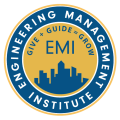In this episode, I talk with Dave Henderson, executive vice president of business development at Asphalt Materials, Inc. (AMI), about innovative pavement preservation strategies that extend road life and cut costs. We also explore how proactive planning and bold innovation drive more sustainable infrastructure for asphalt contractors and public agencies.
Engineering Quotes:
Here Are Some of the Questions I Ask Dave Henderson:
- How can DOT engineers apply proactive pavement preservation strategies to extend road life while working with limited budgets?
- What is the difference between pre-preservation and traditional pavement preservation strategies?
- How have technologies like slurry seals and microsurfacing evolved, and what impact are they having on road maintenance today?
- In what ways do VRAM and RPE work together to improve pavement durability and cost efficiency using advanced preservation technologies?
- Are municipalities across the U.S. struggling to keep up with road maintenance and preservation, and how can innovation help close the gap?
- What factors are driving the nationwide adoption of VRAM, and how is it changing practices for asphalt contractors and engineers?
- How are organizations like FP2 and resources such as RoadResource.org helping engineers adopt better pavement preservation strategies?
- What opportunities do you see for advancing preservation policies and improving infrastructure funding at the national level?
- How do you see AI shaping the future of pavement preservation strategies and evaluation programs?
- What final piece of advice would you give civil engineers who want to build more sustainable and cost-effective road maintenance infrastructure?
Here Are Some Key Points Discussed in This Episode About Pavement Preservation Strategies That Extend Road Life:
- DOT engineers apply proactive pavement preservation strategies by planning network-wide treatments early, including technologies like VRAM at construction and scheduled chip seals or microsurfacing.
- Pre-preservation happens during construction to prevent future problems, similar to installing durable siding on a home. Traditional pavement preservation strategies occur later in the pavement life cycle as a response to deterioration.
- Slurry seals and microsurfacing have become versatile tools within a larger pavement preservation toolbox. They combine asphalt cement for waterproofing and aggregates for structure and friction, keeping roads durable and traffic-ready.
- VRAM seals and strengthens pavement joints from the bottom up, while RPE penetrates from the surface to protect from above. Used together, these preservation technologies block water intrusion, reinforce weak points, and extend road life at a lower long-term cost.
- Many municipalities struggle to maintain road maintenance schedules, as reflected in low infrastructure grades nationwide. Innovative technologies close this gap by preventing damage early and lowering future repair costs.
- Nationwide adoption grows because VRAM consistently delivers results, is simple for asphalt contractors to use, and is supported by transparent specifications. Engineers willing to innovate are accelerating industry change and proving its value in the field.
- FP2 and RoadResource.org spread awareness and provide reliable case studies that help engineers evaluate new pavement preservation strategies with confidence. These resources also create opportunities for small agencies to test technologies and share results across networks.
- Opportunities include stabilizing the Highway Trust Fund and ensuring that all vehicle types contribute fairly to infrastructure funding. Equitable policies paired with engineering judgment can secure long-term sustainability for transportation networks.
- AI improves pavement preservation strategies by capturing detailed data and speeding up analysis. Human expertise still interprets distress patterns, but each year the technology advances closer to providing comprehensive support.
- The key lies in innovation, not just spending. Engineers who embrace proven pavement preservation strategies and new approaches today help create infrastructure that lasts longer and costs less to maintain.
More Details in This Episode…
About Dave Henderson

With over three decades of experience in the asphalt industry, Henderson brings deep expertise in commercial strategy, technical innovation, and market development. His journey began at Koch Materials Company in 1991 and evolved through leadership roles at SemMaterials, Road Science and InVia Pavement Technologies. Since joining The Heritage Group in 2016, Henderson has been instrumental in expanding AMI’s footprint and fostering industry collaboration.
In addition to his role at AMI, Henderson was recently appointed president of FP2 Inc., an organization dedicated to pavement preservation. His two-year term reflects his commitment to advancing infrastructure policy and promoting best practices that enhance the longevity of America’s roadways.
About the Host: K. James Taylor, Jr., P.E.

James was selected as the 2021 Young Engineer of the Year by the American Society of Civil Engineers (ASCE) Delaware Section and is a Delaware Business Times 40 Under 40 2024 honoree. He also serves as the president of the Delaware Engineering Society and on the National Society of Professional Engineers Board of Directors as the New Professionals Director from 2021 to 2023 and currently as the Northeast Region Director. James recently joined the Board of Directors for ACE Mentor Delaware, a no-cost after-school program designed to connect high school students with professionals in the Architecture, Construction, and Engineering (ACE) industry.
Sources/References:
The Joint Solution
Asphalt Materials
The Heritage Group
J-Band VRAM (Void Reducing Asphalt Membrane)
Rapid Penetrating Emulsion (RPE)
Indianapolis Motor Speedway (Indy 500)
American Society of Civil Engineers (ASCE)
Foundation for Pavement Preservation (FP2)
RoadResource.org
U.S. Department of Transportation (DOT)
Federal Highway Administration (FHWA)
Local Technical Assistance Program (LTAP)
Purdue University LTAP (Indiana LTAP)
National Asphalt Pavement Association (NAPA)
American Road & Transportation Builders Association (ARTBA)
Connect with Dave Henderson on LinkedIn
AEC PM Certification
AEC PM Connect
Project Management Accelerator™
Engineering Leadership Accelerator™
Please leave your comments, feedback, or questions in the section below.







